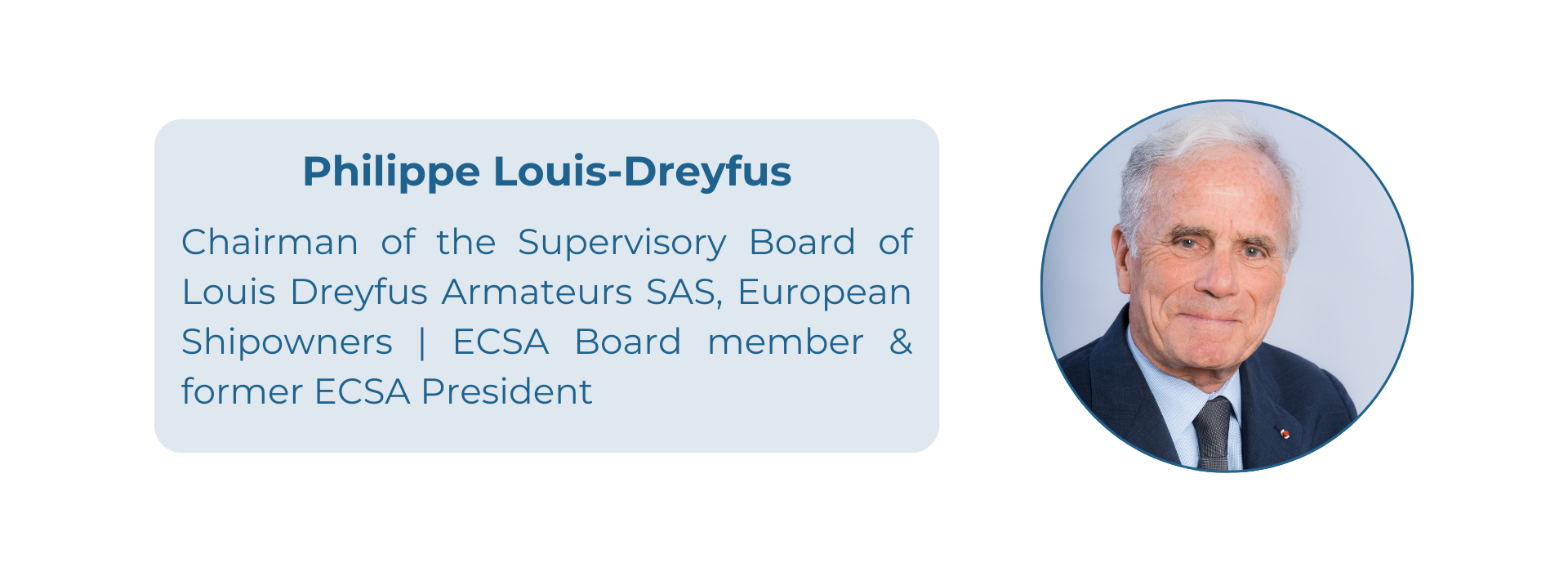Shipping People: Philippe Louis-Dreyfus
In the sixth edition of the interview series #ShippingPeople – meet the European Shipowners, we hand the microphone to Shipping People: Philippe Louis-Dreyfus, Chairman of Louis Dreyfus Armateurs SAS & European Shipowners | ECSA Board member.
Meet Mr. Philippe Louis-Dreyfus, Chairman of Louis Dreyfus Armateurs SAS. Philippe Louis-Dreyfus has long played a central role in European and international shipping and has served as President of Armateurs de France from 2002-2004, President of ECSA from 2006-2009 and President of BIMCO from 2015-2017.

Considering Europe’s goal to meet climate neutrality by 2050, which are the main challenges for shipping? What innovative technologies or alternative fuels do you see as solutions to reduce emissions and achieve the climate targets?
Environmental issues have always been at the top of my agenda, since I joined the shipping industry.
When I was at the helm of ECSA and BIMCO, I had “blown the whistle” many times to alert my colleagues in the industry that we should be more proactive on these matters. Twenty years ago, I was feeling a little lonely. However, things have changed these last years and awareness has significantly improved, driven by a better understanding of the problem by people in shipping, but also due to the very impacting regulations which have been adopted by policymakers.
Talking about solutions to improve our carbon footprint, and since alternative fuels and technologies will not be available worldwide in due time. one of the main proposals from my side, is to reduce the speed of ships. It is a solution that is immediately effective, at no cost, simple to understand and to apply. I continue to fight on the matter.
In light of the increasing digitalisation within the maritime sector, how do you anticipate these advancements will affect the role of seafarers onboard? What measures is your company taking to ensure that seafarers are equipped with the necessary skills and training to adapt to digitalization?
Digitalisation has a first objective, common to the entire fleet of merchant ships: reducing the administrative burden on the crews on board. It is a very good idea because it will allow them to concentrate on tasks with much higher added value. I have a conviction nevertheless regarding everything I hear about autonomous ships. What can be envisaged for transport ships – that will be able to be increasingly assisted in their routing – will not apply to service ships that will always require a significant number of crew members because of their activity. Finally, I believe that ships will never be completely crewless because it is obvious, from an economic perspective, that the maximum amount of ship maintenance must be carried out during crossings, in hidden time.
The European shipping fleet is one of the largest in the world, enabling the EU to play a leading role in the global supply chains. How do you perceive the strategic role of shipping for European security?
Shipping is one of the very few sectors where the EU plays a leading role. Mainly thanks to the Greek fleet, especially in terms of bulk transportation, and also to the French, Danish, Norwegian fleet of service vessels, cable ships, ro-ros, high-tech vessels. Europe should continue to play a leading role, as it is essential for the continent’s economic military and political independence.
For press and media enquiries, please contact:
Luisa Puccio, luisa.puccio@ecsa.eu, +32 492 733623

